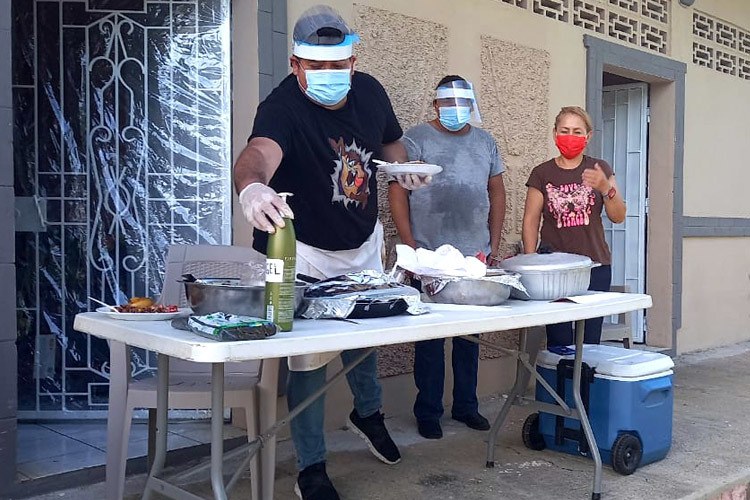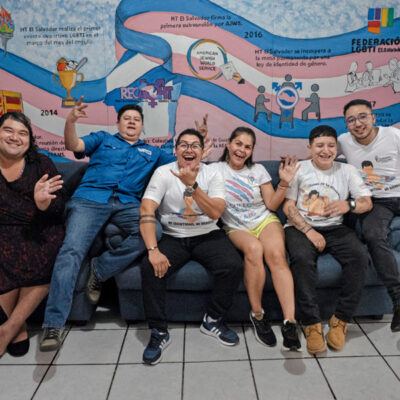Every evening in La Unión, El Salvador, hungry diners line up for delicious dinners cooked by the chefs at Comedor Las Estrellas. Perhaps, if the diners are lucky tonight, they will be serving their famous tortilla soup. The dinner they are waiting for is not from a typical restaurant in La Unión, a small rural community of 34,000 people, but rather from a community kitchen created by AJWS partner Estrellas del Golfo (Stars of the Gulf) that serves food at a significantly reduced cost to the local LGBTQI+ population. Estrellas del Golfo is the sole LGBTQI+ organization that serves the rural community of La Unión.
Creating the Community Kitchen
While it is now a La Unión staple, the community kitchen has only existed for the past few years. It was created in response to the financial hardships that the COVID-19 pandemic brought to the LGBTQI+ community. According to founder Ever Daniel Pacheco, the staff of Estrellas noticed that the pandemic was affecting the LGBTQI+ community especially badly, due to the stigma and discrimination the community always faces in finding employment, coupled with the economic fallout of the pandemic.
“Many people were vulnerable and didn’t have access to food and their normal livelihoods… So we tried to support the populations we work with,” Ever shared.
Ever explained that the team had a dream to create a community canteen that could provide both food and jobs—two of the biggest unmet needs—to the local LGBTQI+ community. AJWS’s support allowed them to make that dream a reality.”
“Thanks to AJWS, we had the support to engage in this process of creating the canteen and did it in a successful manner and we were able to provide food and livelihoods to our population, even beyond La Unión.”
By adding a delivery service, Estrellas was also able to provide food to LGBTQI+ people who live in remote rural communities outside of La Unión.

Public Health Guidelines and Public Good
Establishing a kitchen that would serve hundreds of meals a week was not easy in the middle of the pandemic. This challenge was heightened because El Salvador’s president Nayib Bukele instituted one of the world’s strictest COVID-19 lockdowns.
Even once the lockdown was lifted in June 2020, the country still had extensive restrictions, so the team had to jump through hoops to open the canteen. Estrellas’ leader and one of the kitchen’s founders, Yeny Bonilla, shared that “we had strict security protocols provided by the different ministries of the state, the Ministry of Health and police. There was a set of guidelines that we had to stick to and that increased the complexity of the project we were implementing.”
Despite the shifting public health landscape, Estrellas was able to safely open the kitchen and feed community members through takeout or delivery. In the hopes of making their takeout and delivery service as sustainable as possible for frequent diners, they chose to deliver in reusable containers.
“To observe a series of security protocols when we had opened the kitchen, we started delivering and serving takeout meals in Tupperware,” said Ever. “We always use hand sanitizer, and also use a face mask in order to protect the population.”
Fighting the Stigma Against the LGTBQI+ Community
Before the pandemic, Estrellas was an organization that supported the LGBTQI+ community of La Unión and surrounding areas. The organization was founded in 2009 and, crucially, is one of few LGBTQI+ organizations that exist outside of the capital city, San Salvador. The community center that Estrellas runs along with the community kitchen provides a safe space for the LGBTQI+ community that otherwise would not exist in this region.
Importantly, Estrellas educates the local community about LGBTQI+ issues by conducting workshops on stigma, discrimination, human rights and gender identity, including addressing a bill for a proposed gender identity law that would prohibit discrimination in the country.
Estrellas works with local and national politicians to teach them about ways they can be more sensitive to the issues that the LGBTQI+ community faces.
“We give workshops on stigma and discrimination to the attorney general’s offices, to the public prosecutors, to the national institutions, to the National Human Rights Office,” Ever said.
Going forward, the Estrellas team plans to continue to conduct these workshops and outreach to educate the larger community on how to be accepting of their LGBTQI+ neighbors. It also will continue to expand its community kitchen — while it originally grew out of a need to provide food for the LGBTQI+ community in the challenging context of high unemployment and unaffordable food prices during the pandemic, the kitchen is now here to stay.

Creating Employment Opportunities
Because the pandemic brought with it record unemployment rates for the LGBTQI+ community of La Unión, the Estrellas team is proud that the kitchen has become a reliable source of jobs. From the beginning, the team prioritized employing members of the LGBTQI+ community.
“If someone said, ‘I can’t find a job,’ then we hired them. So this community kitchen has been, as a matter of fact, a great opportunity for the people we’ve hired,” Ever shared.
Many members of the local community have been able to create meaningful careers after gaining experience from cooking at the community kitchen. When Estrellas “lost” a member of the kitchen staff because they got a job elsewhere, it was viewed as anything but a loss. “This has been a great opportunity for some of our colleagues who have decided to start their own business or open their own restaurant,” Benjamin Reyes, another Estrellas leader and kitchen supervisor, shared.

Seating Diners for the First Time
When the canteen opened, it was only able to offer takeout and delivery to operate safely during the COVID-19 pandemic. Starting November 2022, the team was finally able to open for indoor dining.
“The kitchen opened its doors so our community can go there, have coffee and meet other people,” Yeny said. “People regard the community kitchen as part of the LGBTQI+ safe spaces. People know that they can come and have a full meal for a few cents and feel safe in an LGBTQI+ space, and it will be even more of a safe community space with our doors open.”
Yeny shared that she hopes that this project will provide the community of La Unión with affordable food for years to come.
“Undoubtedly this kitchen will be an impact that has created ripples, and this continues to be our flagship project to support our population, especially through food, which is a right that we all have. We hope that this project will be self-sustainable in the future.”
Ever shared that he hopes that the younger generations will take up the work of continuing this project.
“From my point of view, I see this as something I inherited that we will pass on to coming generations.”


